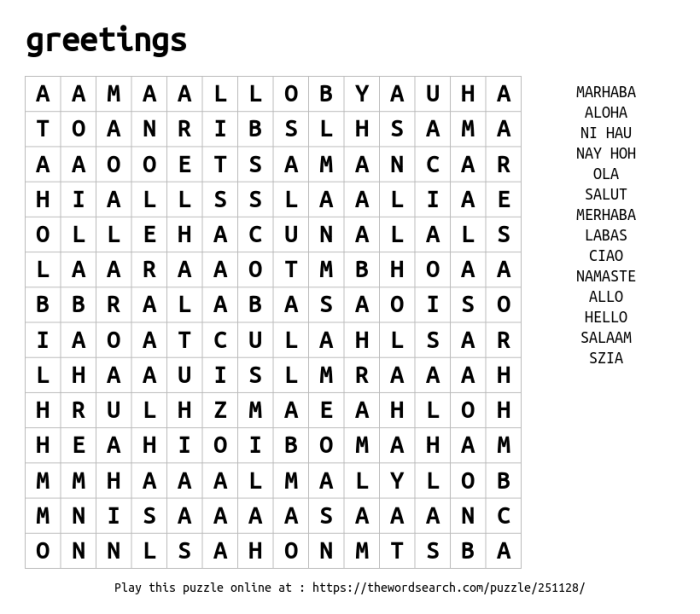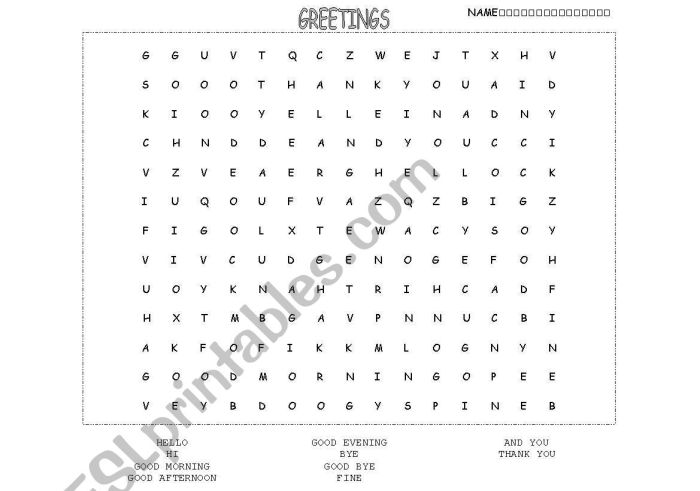Embark on a linguistic journey with saludos y despedidas word search answers, an educational and engaging exploration into the vibrant world of Spanish greetings and farewells. Discover the nuances of Spanish communication, delve into cultural insights, and enhance your language learning experience with our comprehensive guide.
Uncover the secrets of Spanish greetings, from formal to informal, and delve into the cultural significance and etiquette that shape these everyday interactions. Contrast the subtle differences between various farewells, and gain insights into the regional variations that reflect the rich tapestry of Spanish-speaking communities.
Word Search Solutions
Word searches are puzzles that consist of a grid of letters in which words are hidden. The goal is to find and circle all the words that are listed in a word bank. Word searches are a fun and educational way to improve vocabulary and spelling skills.
The following table lists some commonly used Spanish greetings and farewells:
| Greeting | Translation |
|---|---|
| Hola | Hello |
| Buenos días | Good morning |
| Buenas tardes | Good afternoon |
| Buenas noches | Good evening |
| Adiós | Goodbye |
| Hasta luego | See you later |
| Nos vemos | See you |
Here is a sample word search puzzle using the words from the table:
A D I O S B U E N O S D I A S H O L A N O S V E M O S N O C B U E N A S T A R D E S L U E G U E N A S N O C H E S A D I O S A H O L A N O S V E M O S N O C D I A S B U E N A S T A R D E S I O S A D I O S B U E N O S D I A S A D I O S B U E N A S N O C H E
Here are some additional Spanish greetings and farewells for variations:
- Buenos días
- Buenas tardes
- Buenas noches
- Hola
- Adiós
- Hasta luego
- Nos vemos
- Chau
- Hasta mañana
- Hasta pronto
Spanish Greetings and Farewell Variants

The choice of greeting or farewell in Spanish depends on the context and the relationship between the speakers. Formal greetings are typically used in professional settings or when addressing someone you don’t know well. Informal greetings are used in more casual settings, such as among friends and family.
Here is a list of formal and informal greetings, along with their appropriate usage:
- Formal greetings:
- Buenos días (Good morning)
- Buenas tardes (Good afternoon)
- Buenas noches (Good evening)
- Hola (Hello)
- Informal greetings:
- Hola (Hello)
- ¿Qué tal? (What’s up?)
- ¿Cómo estás? (How are you?)
- ¿Cómo te llamas? (What’s your name?)
The cultural significance and etiquette of Spanish greetings is important to understand. In Spanish-speaking cultures, it is considered rude to not greet someone when you meet them. It is also important to make eye contact and smile when greeting someone.
There are also different nuances to Spanish farewells. The most common farewell is “Adiós,” which is used in both formal and informal settings. Other farewells include “Hasta luego” (See you later) and “Nos vemos” (See you).
Educational Applications

Word search puzzles can be used in a variety of educational applications. They can be used to teach vocabulary, spelling, and grammar. They can also be used to reinforce concepts that have been taught in class.
Here is a lesson plan that incorporates the word search puzzle for teaching Spanish vocabulary:
- Begin by introducing the topic of Spanish greetings and farewells.
- Write the words from the word search puzzle on the board.
- Have students work in pairs to complete the word search puzzle.
- When students have finished, go over the answers together as a class.
- Have students write sentences using the words from the word search puzzle.
Here is a quiz or worksheet that can be used to assess students’ understanding of Spanish greetings and farewells:
- Translate the following greetings into English:
- Hola
- Buenos días
- Buenas tardes
- Buenas noches
- Translate the following farewells into English:
- Adiós
- Hasta luego
- Nos vemos
- Which greeting would you use when meeting someone for the first time?
- Which farewell would you use when saying goodbye to a friend?
Here is a role-playing activity that can be used to practice using Spanish greetings and farewells in different scenarios:
- Divide students into pairs.
- Give each pair a scenario card.
- Have students role-play the scenario, using Spanish greetings and farewells.
- When students have finished, discuss the role-plays as a class.
Word search puzzles can also be incorporated into a language learning app. This can be a fun and engaging way for students to learn new vocabulary and practice their skills.
Cultural Insights: Saludos Y Despedidas Word Search Answers
Spanish greetings and farewells reflect the culture and values of Spanish-speaking communities. They are a way of showing respect and building relationships.
There are some regional variations in Spanish greetings and farewells. For example, in some parts of Spain, it is common to kiss both cheeks when greeting someone. In other parts of Spain, it is more common to shake hands.
Body language and non-verbal cues are also important in Spanish communication. For example, it is considered rude to not make eye contact when speaking to someone.
Understanding the cultural aspects of Spanish greetings and farewells is important for effective communication in Spanish-speaking communities.
Common Queries
What is the significance of body language in Spanish greetings and farewells?
Body language plays a crucial role in Spanish communication, complementing verbal expressions. Eye contact, gestures, and physical proximity convey nuances that enhance the meaning of greetings and farewells.
How can I incorporate saludos y despedidas word search puzzles into my Spanish language learning?
Word search puzzles provide an interactive and engaging way to reinforce vocabulary related to greetings and farewells. Create puzzles using commonly used words or phrases, and encourage learners to find and identify them.